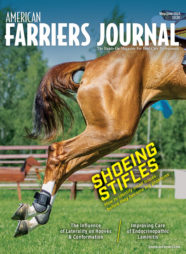FARRIER TIPS
Recently Ohio, farrier Dean Moshier and American Farriers Journal Senior Editor Jeremy McGovern were on Stable Scoop, an equine-themed Internet radio show.
Among the topics, the hosts asked Moshier for hoof care advice for horse owners. Instead of simply one, he gave them a Top 10 (plus 1) of things that all horse owners should know. Here is his list to pass along to any horse owner that might need a like help with recognizing these.
1) Be observant: can prevent shoe loss in the case of a shoe being sprung or a potential puncture or foreign body in the hoof.
2) Pay at the time of service. Nothing is more aggravating than having to chase people down for money. We are NOT banks that give free loans. If you DO need to postpone payment be upfront about it and perhaps post date a check.
3) Have your horse caught and ready at the appropriate time. Have the feet clean and picked out.
4) Exercise before the farrier arrives can make an older horse more limber and a fiesty younger one calmer. We appreciate this as it comes to the comfort of both the farrier and the horse.
5) Do not feed any of the other horses in the barn. You get wiggly too in a restaurant after you have ordered and the food arrives at the table NEXT to you.
6) Do not feed him treats in an effort to make him stand still.
7) Do not turn any horses out while the farrier is working on the horse. Horses are herd animals. Turning a buddy out causes the horse unneeded anxiety, and will clearly affect his willingness to cooperate.
8) Please do not groom your horse while the farrier is working on him. While it may calm and relax him, I can assure you the amount of dirt and hair that lands on the farrier will not supersede it.
9) Provide the best shoeing environment as possible. This means a barn with an open, quiet aisle-way free from obstructions, including dogs. A flat area hopefully matted that is well lit. Easy access to the shoeing truck is a wonderful thing when one considers how many trips back and forth there may be in the shoeing of just one horse.
10) Make sure that if your horse DOES have any behavior problems or range of motion issues that you let the farrier know BEFORE work begins. Many times I have had owners say after-the-fact: "Wow, he's never stood THAT well before"
11) STAY on a regular schedule. Many problems can be prevented with solid routine maintenance.







Post a comment
Report Abusive Comment